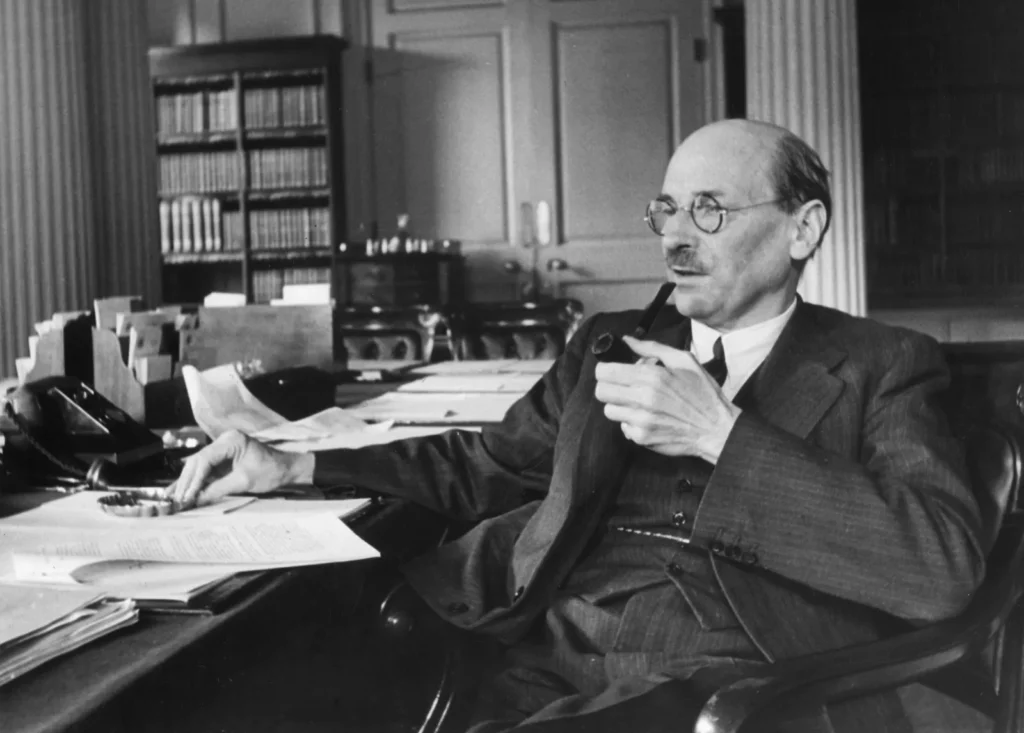
Clement Attlee’s Old Economic Vision: A Blueprint for Modern Britain
In the annals of political rhetoric, few phrases have reverberated as resoundingly as Margaret Thatcher’s resolute declaration: “There Is No Alternative.” A slogan wielded with unwavering conviction, it encapsulated her fervent belief that the market economy stood as the pinnacle of human achievement—a beacon of prosperity that brooked no dissent. As the echoes of Thatcher’s mantra fade into history, we find ourselves at a crossroads, where the very foundations of economic orthodoxy tremble under scrutiny.
Yet this scarcity thinking was always a mere political convenience, a “big lie” to uphold imbalanced privilege. The very notion of TINA or that a currency-issuing government is somehow beholden to the same constraints as a household budget has been repeatedly disproven.
So when Sir Keir Starmer and Rachel Reeves try to justify the Labour Party’s proposal for ongoing austerity by claiming there’s no money, and hope we all continue to buy into the Big Lie of “There Is No Alternative.” Keep two things in mind: firstly, we are a sovereign nation with the ability to create our own currency, and secondly, we have faced far more daunting economic situations in the past and still managed to accomplish transformative change for the betterment of society.
We need only look to the inspirational example set by Attlee’s landmark 1945-1951 government. Inheriting a bombed-out husk of a nation teetering on bankruptcy, his Labour cabinet did not cower behind pathetic excuses about fiscal restraint. No, they boldly charted a visionary path forward.
Rather than falling prey to needless austerity thinking, Attlee embraced Keynesian economics to literally spend Britain out of its malaise through intelligent deficit spending and public investment. With little existing capital for grandiose planning, Labour adopted Keynes’ doctrine of overall control over the deficit to steer systematic economic revival.
The results were nothing short of miraculous. Through an array of interventionist policies – from widespread nationalization of key industries, to robust workers’ rights legislation, to the establishment of the welfare state anchored by the National Health Service – Attlee constructed an ethical commonwealth with equality and public wellbeing as its foundational principles.
All of this was achieved mere months after the country’s factories and infrastructure lay in ruins. If such a profound transformation could be realized during those darkest of circumstances, there is no excuse for the politics of austerity today from a Labour Party awash in billions from years of quantitative easing.
Starmer and Reeves seek to govern from a position of engineered scarcity. Continuing Tory fiscal policy of needlessly binding the hands of government as a virulent regression of neoliberal orthodoxy. But we need only study Attlee’s precedent to realise this path is akin to cowardice, not economic pragmatism.
As a sovereign currency issuer, the UK is never truly “broke” in any meaningful sense. Deficits are simply the result of the government spending more into the economy than it taxes back – a powerful Policy lever when applied judiciously as Attlee proved.
A New Jerusalem

Clement Attlee’s Labour government (1945-1951) provides a prime example. Keynesian principles, focusing on government intervention to stimulate demand, were central to Attlee’s success. Unlike austerity measures, Keynesian economics prioritises under-consumption, not over-production, as the root cause of economic woes.
Attlee’s vision of rebuilding Britain into an egalitarian society began quite literally with bricks and mortar. From a slow start in 1945-1947, his government’s new housing completions rapidly accelerated, averaging around 200,000 new homes per year from 1948-1951. By the end of his tenure, over one million new residential properties had been constructed – including a staggering 806,857 council houses providing quality public housing on an unprecedented scale.
On top of this civilian home-building blitz, 156,623 prefabricated houses were also erected, offering temporary but sturdy accommodations that provided decent shelter for years to come as the nation regained its feet. Auxiliary to the new construction, hundreds of thousands of existing properties were refurbished and converted during this prolific six-year period.
This gargantuan program amounted to a massive economic stimulus, injecting vital job creation across every sector from masonry and carpentry to plumbing and painting. The multiplier effect rippled outward, uplifting not just the construction trades but adjacent supply industries like timber, steel, and aggregate suppliers. Even local retailers experienced a renaissance as newly-housed workers fueled pent-up consumer demand.
In both its physical and economic impacts, Attlee’s housing initiatives represented the tangible construction of a new, more equitable society from the rubble of the old. If this stunning rebuild could be achieved in the aftermath of total war, it serves as a standing rebuke to any modern Labour leader claiming lack of resources as an excuse for continued austerity. Truly, brick-by-brick, Attlee was erecting his “New Jerusalem” into reality.
Michael Foot rightly claims, “This achievement was no small one in the first years after the war when the country was also engaged in a big factory-building programme. It far surpassed anything achieved in Britain after 1918 or in most countries after 1945”.
A Brighter Future: Rebuilding Britain with Keynesian Economics

Britain’s current outlook is stagnant, with the Labour Party only course to adopt the Tory Party’s fiscal policies. However, history offers a compelling alternative: Keynesian economics.
Attlee’s government implemented several key policies:
- Increased social spending: Pensions, unemployment benefits, and worker protections were expanded, boosting public consumption and employment.
- Price and rent controls: Inflation was kept in check, protecting citizens’ purchasing power.
- Strategic nationalization: Key industries like coal, steel, and utilities were brought under public control, ensuring essential services were available to all.
- Investment in infrastructure: Housing projects and the New Towns Act revitalized war-torn areas.
The results were impressive:
- Economic growth: Britain became Europe’s top performer with a 3% annual growth rate, surpassing even the US.
- Low unemployment: Joblessness stayed below 2% for most of Attlee’s term.
- Stable currency: Import limitations and rising exports strengthened the value of the pound.
Attlee’s government also prioritised social well-being:
- The National Health Service (NHS): Established in 1948, the NHS provided free, universal healthcare, a cornerstone of British society to this day.
- Education reforms: Free secondary education, scholarships, and increased teacher wages bolstered education for all.
- Universal Social Security: The National Insurance Act provided a safety net for citizens.
Attlee’s legacy is a testament to the power of Keynesian economics. By stimulating demand, investing in the public good, and prioritising social welfare, Britain thrived under his leadership.
The current economic stagnation suggests it’s time to revisit these successful strategies. A return to Keynesian principles, with targeted government intervention and investment, can pave the way for a brighter future for Britain’s people. But here we have the crux of the issue. This Labour Party in name only…
If Britain could raise itself from the apocalyptic ashes through robust fiscal action in 1945, reviving industry and constructing an unparalleled social support system virtually from scratch, there can be no excuse for choreographed parsimony in our relatively stable modern condition.
The stunning rebuild achieved from Britain’s nadir – over 1 million homes, nationalized industries, and the very pillars of the modern welfare system established in the rubble of postwar deprivation – exposes the bankrupt thinking of claims there is “no money” for grand ambitions today. As a sovereign currency issuer, the UK can embrace deficit spending as Attlee did, investing in its people as the most potent economic policy.
However, this “new management” has betrayed its roots by abandoning such ambition. Starmer’s Labour exists not to uplift the many, but to grease the wheels of globalized capital – a subservient corporate auxiliary willingly nestling into bed with the very oligarchs who have gambled the economy into mutinous ruin. There is no courage remaining, no vision for a re-empowered commonwealth. Just the meek regurgitation of neoliberal austerity mordantly recalibrated as their sole, jokeless “alternative.”
The truth remains, the only thing bankrupt in this country is our parliament where both the Tories and Labour have abandoned the people. Forsaking them for the glitter of lobbyist gold. A new workers’ party is needed if only to rediscover who politicians are supposed to represent and to find the courage and vision to meet today’s challenges as Attlee did long ago when once we strived to build a new Jerusalem.
Support Independent Journalism Today
Our unwavering dedication is to provide you with unbiased news, diverse perspectives, and insightful opinions. We're on a mission to ensure that those in positions of power are held accountable for their actions, but we can't do it alone. Labour Heartlands is primarily funded by me, Paul Knaggs, and by the generous contributions of readers like you. Your donations keep us going and help us uphold the principles of independent journalism. Join us in our quest for truth, transparency, and accountability – donate today and be a part of our mission!
Like everyone else, we're facing challenges, and we need your help to stay online and continue providing crucial journalism. Every contribution, no matter how small, goes a long way in helping us thrive. By becoming one of our donors, you become a vital part of our mission to uncover the truth and uphold the values of democracy.
While we maintain our independence from political affiliations, we stand united against corruption, injustice, and the erosion of free speech, truth, and democracy. We believe in the power of accurate information in a democracy, and we consider facts non-negotiable.
Your support, no matter the amount, can make a significant impact. Together, we can make a difference and continue our journey toward a more informed and just society.
Thank you for supporting Labour Heartlands











